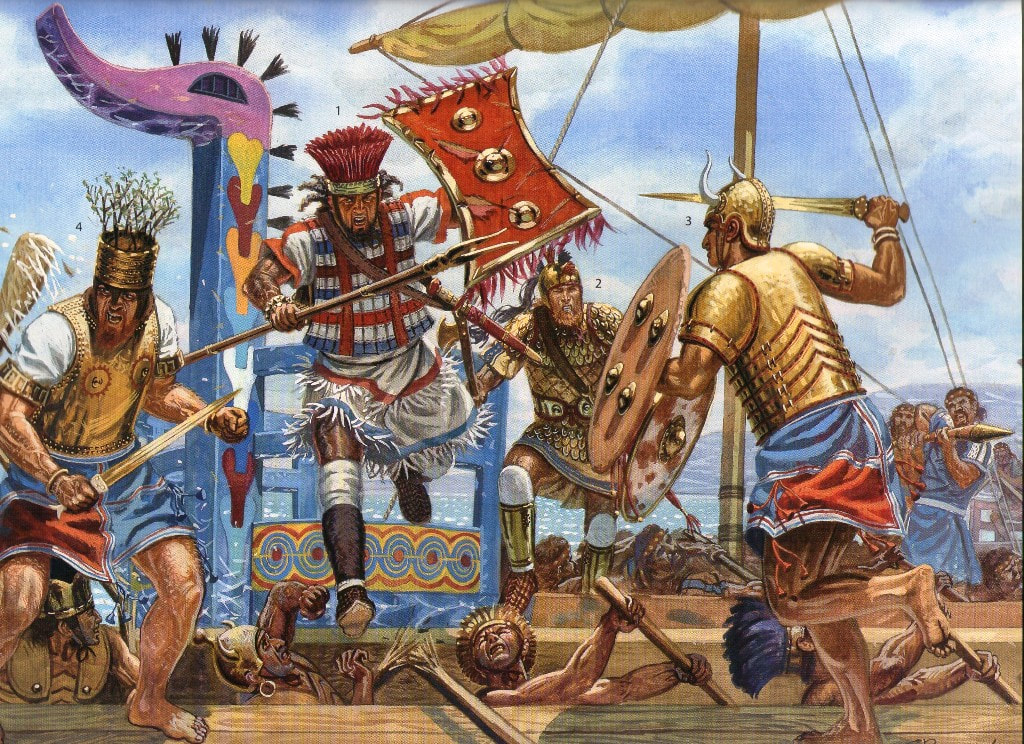 ince the dawn of time, civilizations have come and gone, leaving behind mysterious artifacts, stories, and legends. The Sea Peoples are a particularly intriguing example of vanished cultures who left an indelible mark on our modern world. The Sea Peoples were a seafaring confederation who traveled throughout the Mediterranean and Levantine regions during the 13th century BC. To this day, we still don’t know exactly why they disappeared as suddenly as they did – but what we do know is that their legacy lives on in language, religion, mythology, and literature. In this article, we’ll explore who the Sea Peoples were and where they came from; delve into theories about their disappearance; discuss evidence of their existence; and ultimately explore how their legacy has shaped the culture we live in today.
ince the dawn of time, civilizations have come and gone, leaving behind mysterious artifacts, stories, and legends. The Sea Peoples are a particularly intriguing example of vanished cultures who left an indelible mark on our modern world. The Sea Peoples were a seafaring confederation who traveled throughout the Mediterranean and Levantine regions during the 13th century BC. To this day, we still don’t know exactly why they disappeared as suddenly as they did – but what we do know is that their legacy lives on in language, religion, mythology, and literature. In this article, we’ll explore who the Sea Peoples were and where they came from; delve into theories about their disappearance; discuss evidence of their existence; and ultimately explore how their legacy has shaped the culture we live in today.
Overview of the Sea Peoples: Who were they and where did they come from?
The Sea Peoples are a mysterious seafaring confederation whose legacy lives on in modern culture. They raided and traded in the Mediterranean and Levantine regions during the 13th century BC, leaving behind an indelible mark on history. But who were the Sea Peoples and where did they come from?
The Sea Peoples were a confederation of seafaring raiders and traders who operated in the Mediterranean and Levantine regions during the 13th century BC. Although their origins remain unknown, many believe they came from various parts of the Aegean, Anatolia, and the Levant. The Sea Peoples are best known for their large-scale raids on coastal cities and settlements, often resulting in destruction and disruption. Archaeological evidence suggests that they brought with them advanced shipbuilding techniques as well as weaponry which enabled them to launch successful raids.
It is possible that social or economic factors such as overpopulation or a lack of resources in their homelands drove them to seek new opportunities elsewhere. The Sea Peoples had access to powerful weapons which gave them an advantage over other civilizations at the time, allowing them to establish trading networks throughout Europe, Africa, and Asia Minor. This allowed them to become an influential maritime power during this period of history.
Their legacy lives on not just through archaeological evidence but also through mythology, literature, language, and religion – all of which have been shaped by these mysterious seafaring people who once roamed our seas centuries ago.
Theories as to why they disappeared: Weapons, disease, or something else?
Theories abound as to why the mysterious Sea Peoples disappeared from the Mediterranean and Levantine regions during the 13th century BC. The most widely accepted theory is that they were destroyed by a combination of weapons, disease, and natural disasters.
Composite bows are thought to have been the primary weapon used against them. This type of bow was made up of multiple pieces of wood, animal horn and sinew, allowing for increased power and accuracy compared to traditional bows. It is possible that these weapons were used by enemies or rivals of the Sea Peoples in order to drive them away from coastal settlements.
Another theory suggests that the Sea Peoples were particularly vulnerable to certain diseases due to their lack of immunity. As a seafaring people, it is likely that they had little contact with other civilizations, meaning they may not have built up resistance to illnesses such as smallpox or influenza which were prevalent at the time.
Finally, some scholars have argued that natural disasters such as droughts or floods may have played a role in their disappearance. While there is no concrete evidence to support this claim, it has been suggested that extreme weather could have caused famine or disrupted trading networks leading to economic hardship for many of their settlements.
Despite all these theories, there is still no clear consensus on what ultimately caused their downfall – a mystery which remains unsolved today. What we do know however, is that their legacy lives on in modern culture through mythology, literature, language and religion – a reminder of an ancient civilization who once flourished in these waters but now lies dormant beneath its depths.
What evidence is there of their existence?
The Sea Peoples are shrouded in mystery, their ultimate fate unknown and their existence debated by historians. Fortunately, archaeological evidence exists that confirms their existence. Artifacts such as jewelry, pottery, and weapons have been found in coastal areas around the Mediterranean which can be attributed to them. These pieces of evidence point to a complex culture with advanced shipbuilding techniques and weaponry.
In addition to physical artifacts, ancient civilizations provide written accounts of the Sea Peoples’ presence in the area. Records from Egypt, Assyria, and other empires in the region describe them as strong seafaring warriors who were feared for their raiding abilities. This is further supported by ancient artwork depicting battles between them and opposing forces.
Theories of assimilation also suggest that some elements of the Sea Peoples’ culture may still exist today. Similar names used by cultures near and far from their original settlements suggest that many aspects of language were adopted into other dialects over time. Religious beliefs shared among cultures across Europe could also be a testament to their impact on modern culture. Language features such as grammatical structures or phonetic shifts are believed to have been adopted from them by various civilizations throughout history.
Finally, certain cultural elements from the Sea Peoples have endured throughout time such as ritualistic practices or traditional music instruments which bear a striking resemblance to those used during this period in history. While none of this proves conclusively that they existed or what ultimately became of them, it does provide supporting evidence for an otherwise mysterious civilisation lost to history centuries ago.
Impact of the Sea Peoples on modern cultures: Possible influence on language and religion
The influence of the Sea Peoples on today’s cultures is unmistakable in terms of language and religion. It is likely that their presence in the Mediterranean and Levantine regions had a lasting impact on Ancient Greek, Latin, and Hebrew. Even today, many words are derived from their tongue.
Moreover, archaeological findings such as cultic objects suggest that certain aspects of their religious beliefs were adopted by other societies. These artifacts include figurines depicting priests or gods and hint at a spiritual component within their culture.
In addition, it has been theorized that the Sea Peoples may have aided in the dispersal of Christianity across the Mediterranean basin during this period. This idea is backed up by churches built along coastal cities associated with them as well as coins displaying Christian symbols at these locations.
Further still, evidence suggests that some components of their culture – rituals, musical instruments, weaponry – were adopted by other civilizations after encountering them through trade or warfare activities. Examples include Mycenaean swords found in Egypt which are believed to have been introduced by these seafaring individuals.
Ultimately, the legacy of the Sea Peoples remains alive in our modern cultures through language and religion – though much about them remains unknown due to their sudden disappearance centuries ago. Nonetheless, it is clear they left an undeniable stamp on our society even now.
How the legacy of the Sea Peoples lives on today: Role in mythology and literature
The Sea Peoples remain an intriguing part of ancient history, and their legacy continues to live on in our society today. From the Epic of Gilgamesh to Homer’s Odyssey, these seafaring people are remembered for their unique cultural practices and impact on later civilizations. Recent archaeological finds have also shed light on their hieroglyphic writing system and art style, offering a glimpse into the lives of those who once roamed the seas. Additionally, some theorists suggest that aspects of modern culture may be rooted in those ancient societies which were connected to the Sea Peoples – such as language, religion, technology and philosophy. As a result, this mysterious group has left behind a lasting impression that is still felt today.
Avid Writer with invaluable knowledge of Humanity!
Upcoming historian with over 30 million views online.
“You make your own life.”





